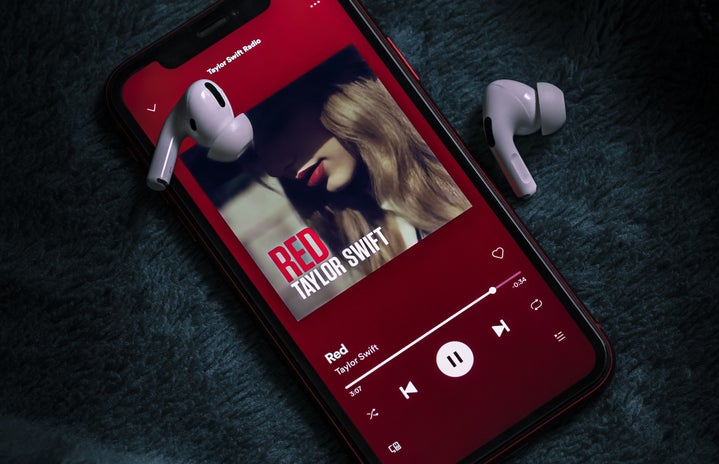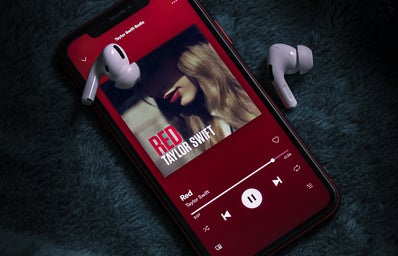As I write this article, I’m listening to Swift’s latest masterpiece “All Too Well (Sad Girl Autumn Version) – Recorded at Long Pond Studios”. Despite what the cliché title may suggest, this rendition of one of Swift’s self-proclaimed “saddest songs” is arguably her most mature and emotional. While the lyrics of the song speak for themselves about the heartache the narrator (Swift) experiences, this soft piano live-recording has a tragic reflective beauty only an adult looking back on a youthful love lost can offer.
This song is a great representation of the theme of the album rerecording as a whole. While Red has always been one of Swift’s most celebrated albums, the original version had an urgency and immaturity indicative of the time in which she wrote and recorded it. The album was criticized during its initial release for being a petty attack aimed at her ex-boyfriend, Jake Gyllenhaal, who is suspected to be the subject of many of Red’s songs. While much of this critique was arguably rooted in sexism, as Swift has often pointed out, there is no doubt that the album’s specificity, ferocity, and sadness are evident of a young person who is “happy, free, confused and lonely at the same time” as the lyrics of 22 suggest.
The rerecording of Red, on the other hand, is anything but capricious. While the album holds true to its original emotional authenticity, it reads as a much more mature and somber reflection on a taxing yet passionate relationship. The new depth of her voice makes songs like “I Almost Do” and “The Moment I Knew” much less tales of child-like longing and much more adult reflections on the disappointment and pull of complex romance.
Her return to this album, at the age Jake Gyllenhaal dated her, lends an interesting component to one of its themes – the transition into adulthood. One of the most telling and blunt lines of the “All Too Well (10 Minute Version)” is, “you said if we had been closer in age, maybe it would have been fine / and that made me want to die.” While the hyperbolic line reflects the tunnel vision that comes with young heartbreak, it also does a great job of depicting the cost of their age gap. Swift’s revisited album reads like a woman who would warn her younger self of the consequences of adult romance.
“Better Man (Taylor’s Version) (From the Vault),” a song initially written by Swift and recorded by Little Big Town in 2017, represents an increasingly mature version of Red’s emotional reflection. Throughout the song, Swift laments on “what could have been” if the subject had been a better man than he was during their relationship. However, she doesn’t claim the desire to change him; rather, she is content with her decision to let him go. She opens the song with “I know I’m probably better off on my own / Than lovin’ a man who didn’t know what he had when he had it.” This type of understanding, that you are entitled to miss something you justifiably abandoned, is difficult to rationalize without lived experience.
“Forever Winter,” another song from the vault, also provides a distinct reflection by Swift on her youth and lack of insight into relationships. She sings, “Too young to know it gets better / I’ll be summer sun for you forever / Forever winter if you go.” Anyone who’s ever been young and falling for someone knows that it feels as if the world will end if they leave. Her acknowledgement of her juvenile fear of “forever winter” in absence of that relationship almost fools the listener into thinking this song was written by present-day Swift, a testament to her foresight even at 22.
The songs similarly suggest her recognition at the importance of being appreciated and valued in relationships, a message we — especially as young women — stand to learn from. Lines like: “The idea you had of me, who was she? A never-needy, ever-lovely jewel whose shine reflects on you” in “All Too Well,” “And I gave to you my best and we both know you can’t say that… And it was always on your terms / I waited on every careless word… Talking to me like I’d always be around” in “Better Man” and “Does it make you feel sad / That the love that you’re lookin’ for / Is the love that you had?” in “I Bet You Think About Me” are sprinkled throughout the album. Swift’s theme is obvious: know your worth and don’t get taken for granted.
While making poignant, backward looking reflections, Swift doesn’t discount the legitimacy of her naive emotions, a trap we all often fall into when we look in the rearview mirror. In “The Very First Night,” a post-break up Swift acknowledges that her friends can’t understand what she’s going through: “Cause they don’t know about the night in the hotel / They weren’t ridin’ in the car when we both fell / Didn’t read the note on the Polaroid picture.” As we grow up and become removed from our heightened emotional experiences, we often allow time and maturity to convince us of the invalidity of our feelings. Swift reminds us to be kinder and do ourselves justice.
Red and its subsequent re-release are so much more than a pop album with powerhouse hits like “I Knew You Were Trouble.” Swift’s return to this album with ten years of love, life, and musical prowess under her belt helps tell a story about relationships that makes it that much more beautiful. She provides words of wisdom to her earlier, wounded self and gives a manifesto that all young women can adopt. As she alludes to in “Begin Again,” heartbreak doesn’t last forever, and you can and will find someone who appreciates you for who you are.


